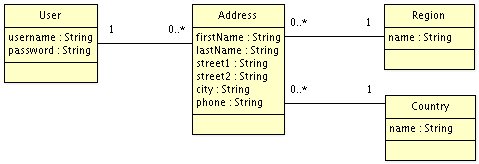
Start by creating a UML model in a tool that supports XMI. I am going to use ArgoUML for all of the examples.
For this example, we will create a simple address book application where a users can store addresses.

java -jar groovymda-1.0.jar 'jar:file:./addressbook.zargo!/addressbook.xmi'
After running the command you will notice Java source files are created. If you want to change the output directory add a second argument for the output directory when running the command.
For the command above, there will be a generated directory structure and java source files show below:
-- com
`-- acme
`-- domain
|-- Address.java
|-- Country.java
|-- Region.java
`-- User.javapackage com.acme.domain;
import java.io.Serializable;
import java.util.Date;
import java.util.HashSet;
import java.util.Set;
import javax.persistence.CascadeType;
import javax.persistence.Column;
import javax.persistence.Entity;
import javax.persistence.FetchType;
import javax.persistence.GeneratedValue;
import javax.persistence.GenerationType;
import javax.persistence.Id;
import javax.persistence.JoinColumn;
import javax.persistence.JoinTable;
import javax.persistence.Lob;
import javax.persistence.ManyToMany;
import javax.persistence.ManyToOne;
import javax.persistence.NamedQueries;
import javax.persistence.NamedQuery;
import javax.persistence.OneToMany;
import javax.persistence.OneToOne;
import javax.persistence.Table;
import javax.persistence.Temporal;
import javax.persistence.TemporalType;
/**
* User Domain Object
*/
@Entity
@Table(name = "t_user")
@NamedQueries({
@NamedQuery(name = "User.findAll", query = "from User")
})
public class User implements Serializable {
@Id
@GeneratedValue(strategy = GenerationType.AUTO)
@Column(name = "pk_id")
private Long id;
@Column(name = "c_username")
private java.lang.String username;
@Column(name = "c_password")
private java.lang.String password;
@OneToMany(
mappedBy = "user",
cascade = {CascadeType.PERSIST, CascadeType.MERGE}
)
private java.util.Set<Address> addresss;
public java.lang.String getUsername() {
return username;
}
public void setUsername(java.lang.String username) {
this.username = username;
}
public java.lang.String getPassword() {
return password;
}
public void setPassword(java.lang.String password) {
this.password = password;
}
public java.util.Set<Address> getAddresss() {
return addresss;
}
public void setAddresss(java.util.Set<Address> addresss) {
Address[] tempAddresss = (Address[]) getAddresss().toArray(new Address[getAddresss().size()]);
for (Address address : tempAddresss) {
removeFromAddresss(address);
}
if (addresss != null) {
for (Address address : addresss) {
addToAddresss(address);
}
}
}
public void addToAddresss(Address address) {
if (address != null) {
address.setUser(this);
getAddresss().add(address);
}
}
public void removeFromAddresss(Address address) {
if (address != null) {
address.setUser(null);
getAddresss().remove(address);
}
}
public int hashCode() {
int hashCode;
if (id != null) {
hashCode = 29 * id.hashCode();
} else {
hashCode = super.hashCode();
}
return hashCode;
}
public boolean equals(Object o) {
if (this == o) {
return true;
}
if (!(o instanceof User)) {
return false;
}
final User otherUser = (User) o;
if (hashCode() != otherUser.hashCode()) {
return false;
}
return true;
}
}